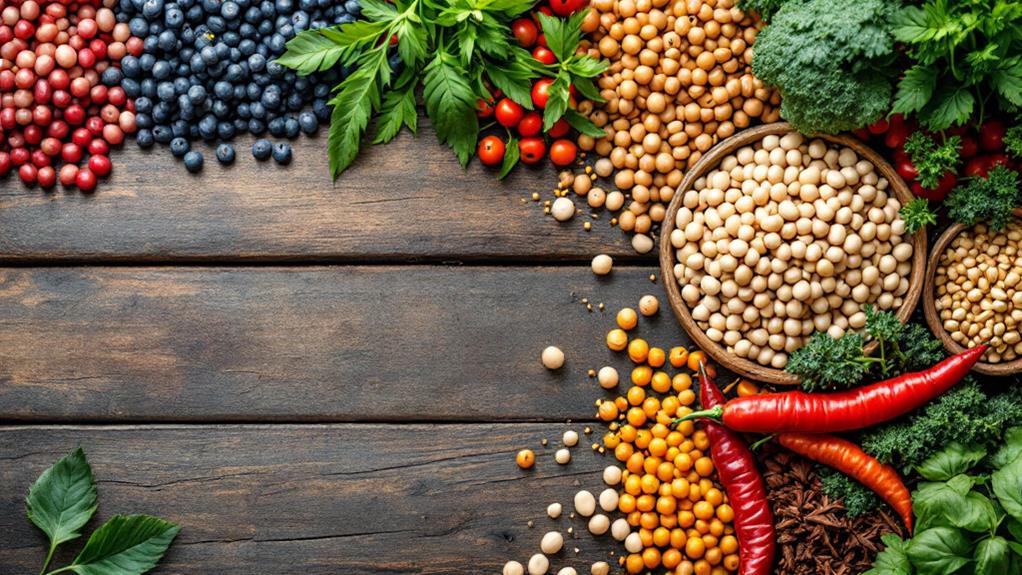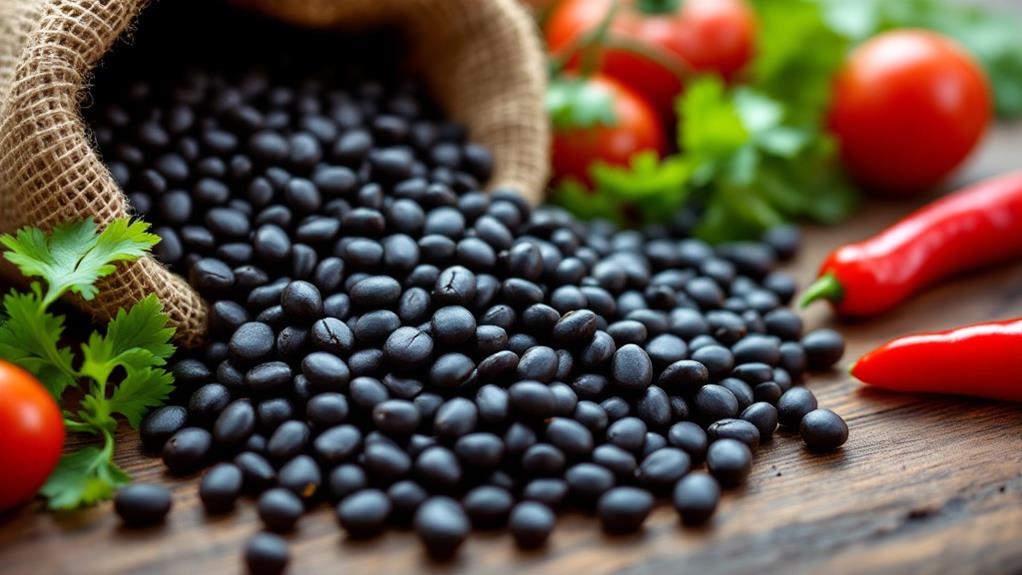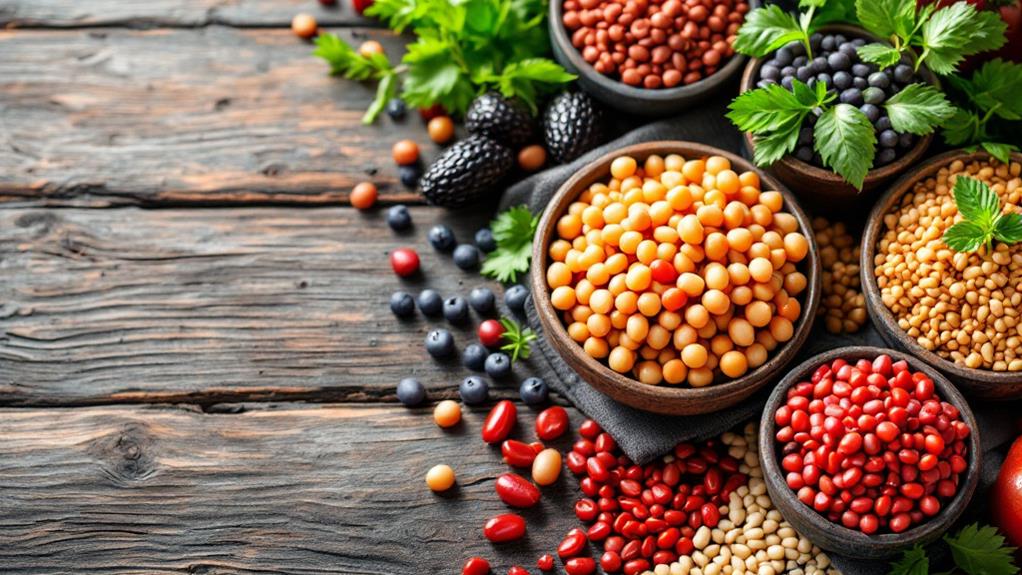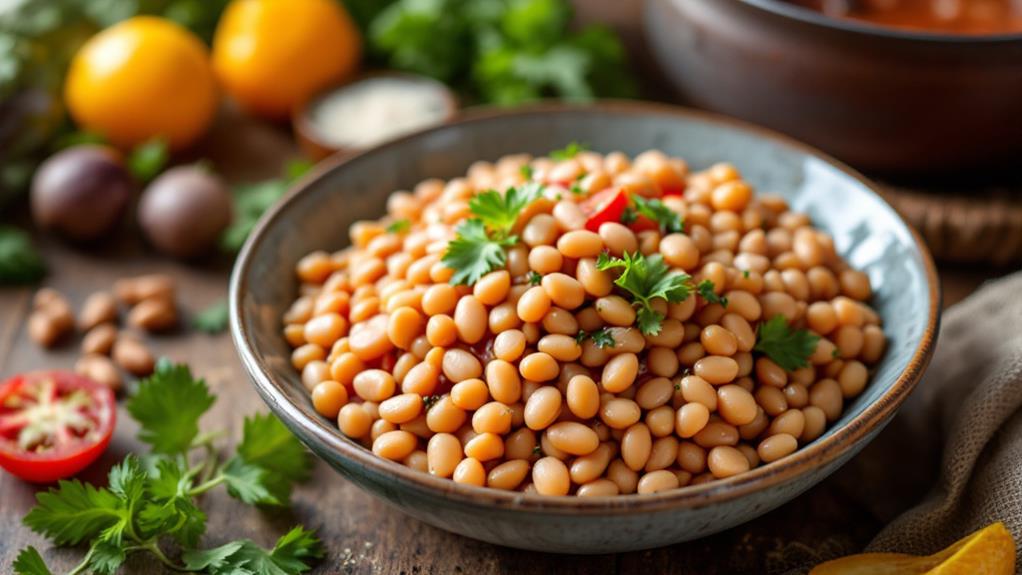Interesting Facts About Beans and Pulses: Surprising Health Benefits
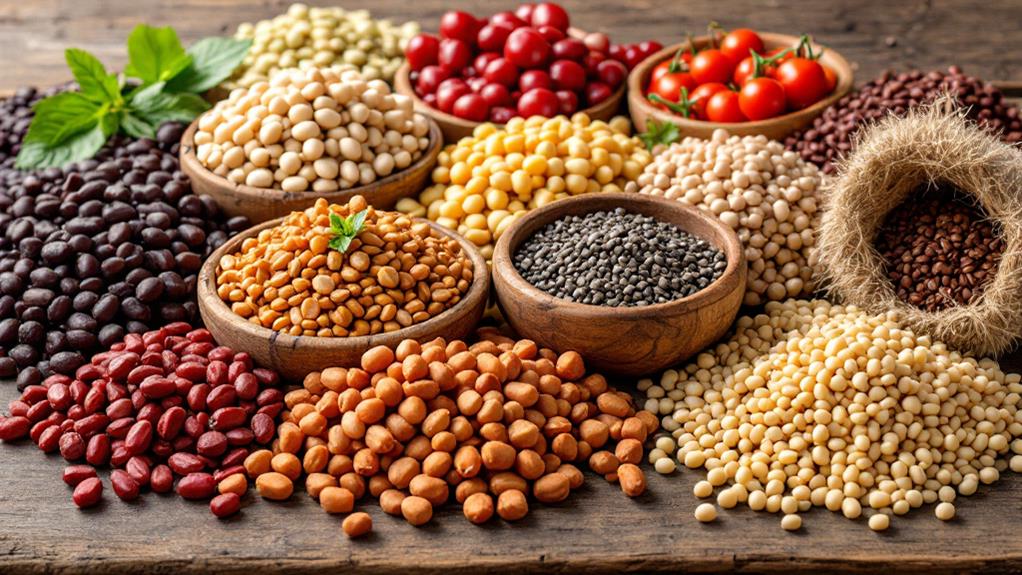
Beans and pulses are nutritional powerhouses with surprising benefits for your health. They're packed with protein, providing 15-25% per serving, and contain 6-9 grams of fiber in just half a cup. This combination supports heart health and digestion while keeping cholesterol low and blood sugar stable. Beans are also rich in vital vitamins and minerals like folate, potassium, and iron. Furthermore, they help combat inflammation and reduce the risk of chronic diseases. Plus, their environmental impact is impressively low, making them a sustainable food choice. Uncover more about how these versatile legumes can improve your diet and lifestyle.
Types of Beans and Pulses
When exploring the varied world of legumes, you'll uncover there are over 16,000 types globally, each with unique characteristics. Among the most popular are beans and pulses, which are staples in many diets due to their health benefits and rich nutrition. Beans, such as black beans and kidney beans, are celebrated for their hearty flavors and nutritional profiles. They are integral plant foods that offer culinary versatility, allowing you to experiment with different cooking methods.
Pulses, which are the dried seeds of leguminous plants, include favorites like lentils and chickpeas. These pulses are nutrient-dense and can be prepared in numerous ways, from soups to stews, making them a go-to ingredient in many cultures. For instance, black beans are a staple in Mexican and Brazilian dishes, while kidney beans are often used in American chili recipes.
Legumes have the advantage of being available in different forms—dried, canned, frozen, or even ground into flour—each offering distinct culinary possibilities. Regardless of whether you're crafting a traditional dish or exploring new recipes, incorporating a range of beans and pulses into your meals guarantees both flavor and nutrition, maximizing their health benefits.
Nutritional Highlights
Exploring the array of beans and pulses introduces not only culinary diversity but also a wealth of nutritional benefits. You'll find that beans are an excellent source of protein, providing 15-25% per serving, making them a standout plant-based option. They pack in 6-9 grams of fiber in just a half-cup serving. This fiber content supports your digestive health by promoting regularity and keeping you feeling full longer, which aids in managing your weight.
Beans are naturally low in fat and completely cholesterol-free, which supports heart health. They also boast a low glycemic index, making them a smart choice for regulating blood sugar levels. This is especially beneficial if you're managing diabetes or trying to maintain stable energy levels throughout the day.
In addition to their protein and fiber, beans are rich in fundamental vitamins and minerals. You'll get a good dose of folate, potassium, magnesium, and iron, all vital for supporting overall health and wellness. These nutrients play significant roles, from aiding in oxygen transport to supporting nerve function and muscle health. Incorporating beans into your diet is a delicious way to enhance your nutrient intake.
Health Benefits
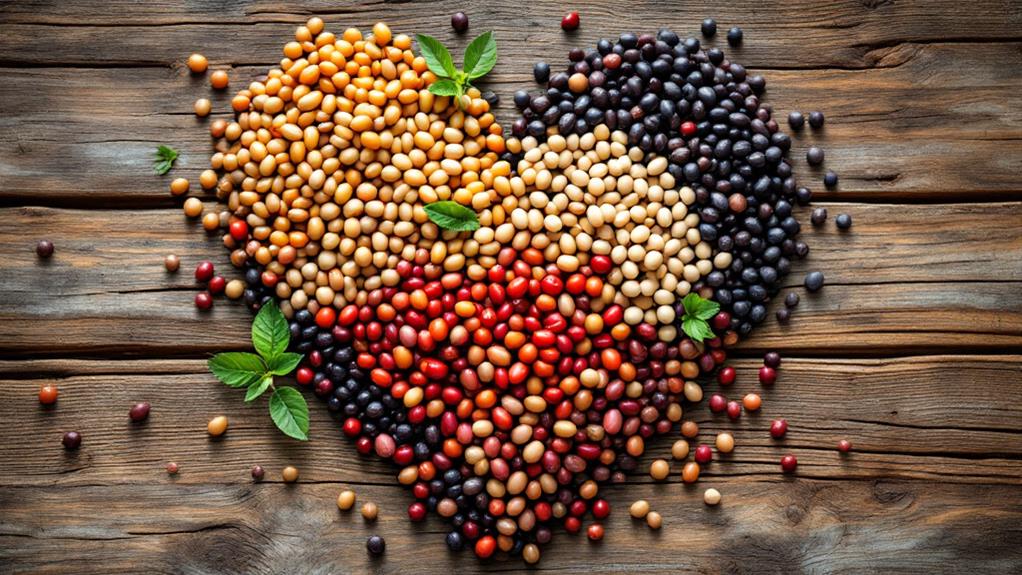
Amidst the many health benefits of beans and pulses, one standout is their impact on heart health. Regular consumption of these plant-based nutrition powerhouses is linked to a 38% reduced risk of nonfatal heart attacks. This is primarily due to their ability to lower total and LDL cholesterol levels. Their rich dietary fiber intake—7-9 grams per cup—not only promotes digestive health but also aids in weight management by enhancing satiety, which can reduce total calorie intake.
Beans and pulses are low in glycemic index, making them terrific allies for stabilizing blood sugar levels. This is particularly beneficial for individuals with type 2 diabetes who need to manage their blood sugar more effectively. With their high protein content, beans offer a satisfying and nutritious alternative to animal proteins, supporting weight management goals without the added saturated fats.
Moreover, the antioxidants in beans and pulses help combat inflammation and oxidative stress. This may lower the risk of chronic diseases, including certain cancers. Consuming these legumes regularly contributes to a holistic approach to reducing the likelihood of heart disease and other chronic conditions, solidifying their place in a health-conscious diet.
Cooking and Preparation
To get the most out of beans and pulses, understanding their cooking and preparation is essential. Start by soaking and cooking dried beans to dramatically cut down cooking time and reduce gas-producing compounds. This step greatly improves their digestibility. In terms of cooking methods, boiling or using a slow cooker not only guarantees beans are cooked thoroughly but also improves their flavor and texture. Don't forget to add herbs and spices for an extra burst of flavor.
Rinsing canned beans is another important step. This simple action removes excess sodium and gas-causing oligosaccharides, making them a healthier and more palatable option. Always cook beans at high temperatures to eliminate harmful lectins present in raw beans, confirming they're safe to eat.
Beans are a versatile ingredient that can easily be included in a variety of dishes. Regardless of whether you're tossing them into a salad, stirring them into a soup, or making them the star of your main dish, they provide diverse flavors and textures. By mastering these preparation techniques, you can fully enjoy the nutritional and culinary benefits that beans and pulses offer.
Environmental Impact

Beans and pulses stand out as environmentally friendly food options. As a sustainable dietary choice, they boast a considerably lower carbon footprint than animal protein sources. By opting for beans, you help reduce the environmental impact associated with food production. One of their remarkable benefits is their ability to improve soil health. Through nitrogen fixation, beans minimize the need for synthetic fertilizers, enhancing soil fertility naturally.
Moreover, beans are champions of water conservation. They require much less water than many traditional crops, making them an excellent choice for preserving this precious resource. When you incorporate beans into crop rotation, they contribute to biodiversity and help suppress pests and diseases, making farming systems more sustainable. This practice not only supports a healthier ecosystem but also reduces dependency on chemical pesticides.
Beans also play an essential role in strengthening local food systems. Their high yield per acre guarantees that farmers can sustain economic viability while providing nutritious food options. By choosing beans, you support farming communities and promote an environmentally conscious diet. Incorporating beans into your meals is a simple yet impactful way to contribute to a healthier planet.
Economic and Dietary Value
While beans and pulses already shine as environmentally friendly food choices, they also offer significant economic and dietary advantages. As a cost-effective source of fundamental nutrients, beans provide high protein, fiber, and vitamins at a low price. This makes them an economical choice for anyone looking to eat healthily without breaking the bank. The USDA recognizes their nutritional value, requiring schools to serve them weekly to meet children's dietary needs. By incorporating beans into your diet, you can enjoy improved nutrition while supporting sustainable eating habits.
Beans and pulses contribute to food security as they can be grown in varied climates, bolstering local economies. Their adaptability guarantees a steady supply, making them a reliable option in different regions. Moreover, the average U.S. consumption of legumes has increased from 8 to 11.7 pounds per capita between 2014 and 2017, highlighting a growing interest in their dietary benefits.
Beyond their nutritional and economic value, beans necessitate less water and land compared to animal protein sources. This contributes to sustainable agricultural practices, making them an excellent choice for those who care about the environment and wish to support sustainable food systems.

